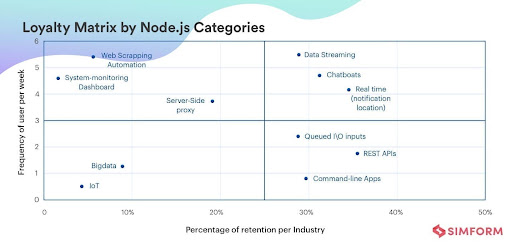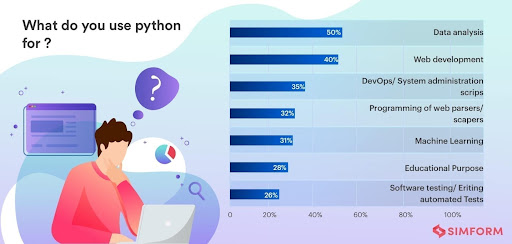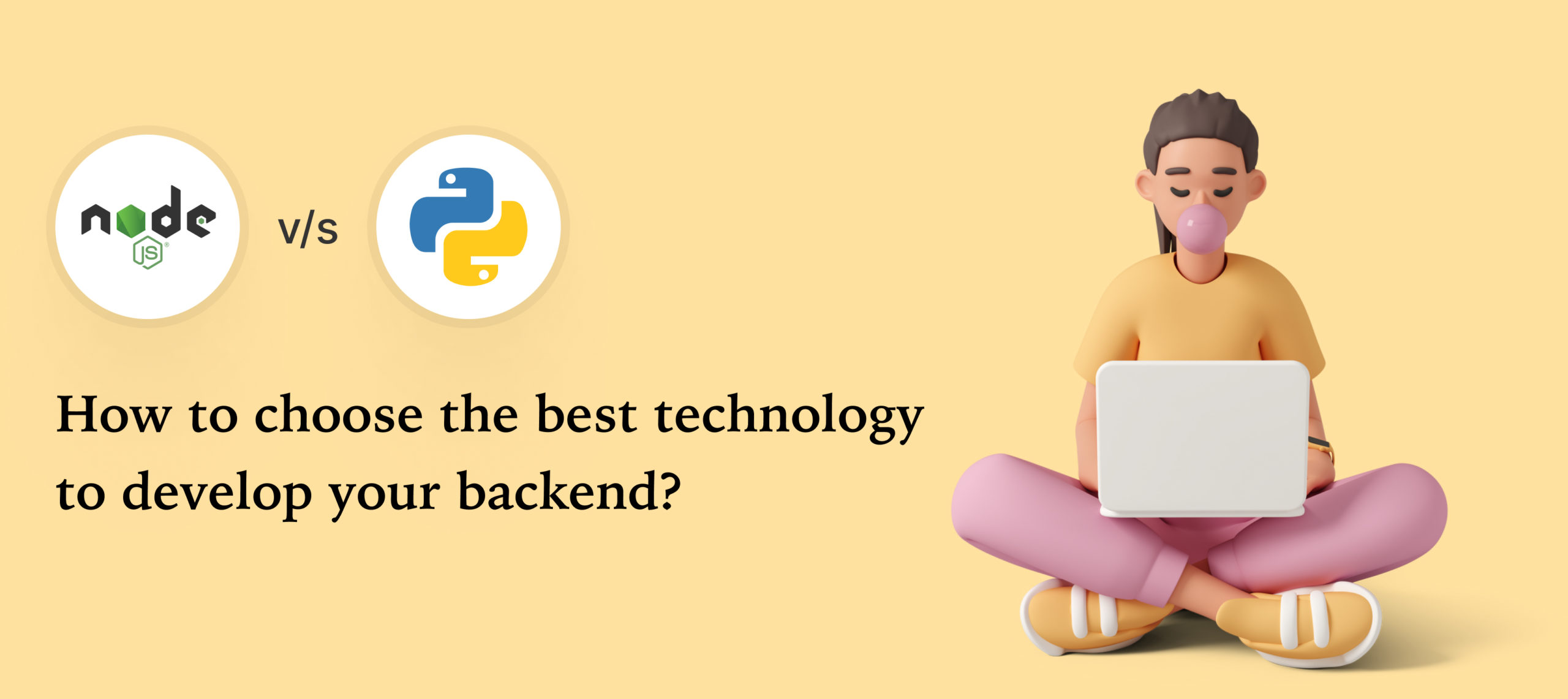Backend development is the process of developing the architecture of a web application on server-side software. From the user’s perspective, it is everything you don’t see on the website.
Think of it as the engine and transmission under the hood.
There are two languages that are preferred for backend development, Node.js and Python.
In this post, we have compared both of these languages on the basis of six parameters to determine a clear winner.
Before we start the debate of Python vs Node.js, let’s understand them in brief.
Introduction to Python and Node.js
Node.js uses a non-blocking, event-driven I/O model and is built on Google Chrome’s JavaScript (JS) V8 Engine. Developers can build data-intensive real-time web apps which can work on different devices.
Written in JS, it runs on Microsoft OSs and Linux.
Python is a dynamic programming language and is used for multiple purposes as it is object-oriented. The syntax and clean interpreted nature make it a preferred coding language for writing code.
Python allows multiple patterns, including functional and procedural programming styles.
A good programming language needs to be fast, easy to learn, scalable, versatile and should offer multiple use cases.
We have examined both languages on the basis of those parameters.
Performance and Speed
Let’s start with the most important feature needed for web and mobile apps – impressive performance and high speed. For every application software, these factors can make or break your app.
Node.js
Nodejs processes multiple requests at once which speeds code execution up with the help of event-driven and non-blocking architecture. It also enables you to script outside the browser through Transmission Control Protocol (TCP) sockets, increasing overall efficiency.
Node.js app development allows caching of retrieved information that is less likely to get modified. This results in a higher speed execution than Python web-app development with the same requirements.
You can execute JavaScript code on the V8 engine (invested in by Google) making the performance and responsiveness of Node.js apps remarkable.
Python
As Python runs a single flow of code it’s can process it slowly as compared to Nodejs. Its architecture restricts multithreading. If your product demands a fast recall of data, Python may not be the best choice.
It’s also not the right option if you want your app to handle complex calculations fast while handling user requests.
Score after first round: Node.js – 1; Python – 0
Versatility
It is the array of apps a programming language can help develop. As both can help build many kinds of apps and are helpful on many platforms it is challenging to choose a winner.
Node.js
A primary reason that makes Node.js popular is that it is a JavaScript (JS) tool. As a result, you can carry out frontend and backend development with it.
It works on multiple platforms; desktop app on Mac, Linux, and Windows OS.
Python
Python is very versatile as well allowing you to do front-end and back-end development work with it.
The cross-platform functionality is impressive too. Linux and Mac have pre-configured Python, for Windows, you need to install a Python interpreter, and python can be installed on Chromebook too.
Python is the go-to language for the Internet of Things (IoT) development and Natural Language Processing (NLP), including web app development.
Considering the degree of versatility of both languages, we awarded a point to each of them.
Score after second round: Node.js –2; Python – 1
Scalability
It is the ease of appending features and functionalities to an existing coding language or dev framework. The easier it is, the more robust your functionality is. Let’s take a look and settle Node.js vs Python in terms of scalability and extensibility.
Node.js
Recently we have seen a boost in Node.js’s business reliability. Hence, more frameworks and/or tools come up based on Nodejs. Below are the four commonly used frameworks of Node.js:
- Babel -frontend development
- Jasmin – testing
- Log.io – project management
- Webpack – module binding
Python
Python offers incomparable scalability and many frameworks for web development.
Here are some of them:
- Robot – acceptance level testing
- Flask – web development
- Web2py – agile development of data-driven web apps
- Django – backend development
This is a head-scratcher as both are great options. So, it is fair to award each of them a point.
Score after third round: Node.js – 3; Python – 2
Learning Curve and Code Complexity
The learning curve is the relationship between how a newbie has completed a task and the time required for completion. Better syntax ensures running functions with as little code as needed.
So, which one has a smoother learning curve and quality syntax of the two?
Node.js
Being a JavaScript-based environment, learning it is simple if you are familiar with JavaScript.
However, some areas take more time, for example, the event-driven architecture, and certain advanced functionalities which impact your app performance greatly.
This is why they are unskippable.
Python
If you lack JavaScript knowledge and have to choose between the two, Python is a much better option. It requires fewer lines for running a function. The code is also easy to read, write, and debug. Furthermore, unlike JS, it does not use curly brackets.
Python is whitespace and indentation-sensitive, learning it will help you learn.
The leaner learning curve and efficient syntax make Python a great option for budding companies with web app products. To retain a competitive advantage, businesses make the obvious investment of hiring Python developers proficient in backend and frontend development.
Score after fourth round: Node.js – 3; Python – 3
Error Handling
It is important for two reasons:
- Keeps the code clean for reading and debugging
- Improves the user experience for users.
So, who is the winner here?
Node.js
Node.js’s multithreading ability improves performance, but as multiple requests run parallelly, runtime exceptions are common, and they can be too much to handle.
Python
Python generates clean and compact code. Moreover, its absence of simultaneous processing capacity makes debugging simple.
No matter what technology you prefer, clean code is a priority awarding Python the victory here.
Score after fifth round: Node.js – 3; Python – 4
Use Cases
According to a Stack Overflow survey, Node.js was the most preferred tool while Python was the most loved language.
Here, let’s take a look at how other successful web apps find Node.js and Python.
Node.js
It is for you if your web app is data-intensive or needs real-time information transfer, due to its higher data streaming efficiency. You can use it for apps with loaded client-side functionalities and firm resources, like:

(Source)
Some companies that use Node.js: Amazon, LinkedIn, Tumblr, PayPal, and Netflix.
Python
Python has been around for a while, and its increasing popularity speaks for its clean code and functionalities. Despite being slower, the troubleshooting, detailed documentation, and thriving community of developers make it desirable.
We have compiled the preference for Python by professionals from a survey below for various use cases:

(Source)
Some companies that use Python: NASA, Reddit, Facebook, Google, Pixar, and Spotify.
As it is evident, both are unique, with a wide range of high-profile use cases. Hence, here too, we decided to award both of them a point.
Score after sixth round: Node.js – 4; Python – 5
Even though our analysis awards the crown to Python, it is crucial to keep the unique requirements of your project in mind while choosing a language or framework for backend development.
For instance, if you prefer performance over error handling, go for Node.js. However, choose Python if you desire a leaner learning curve.
As we mentioned earlier, choose one that suits your needs.
